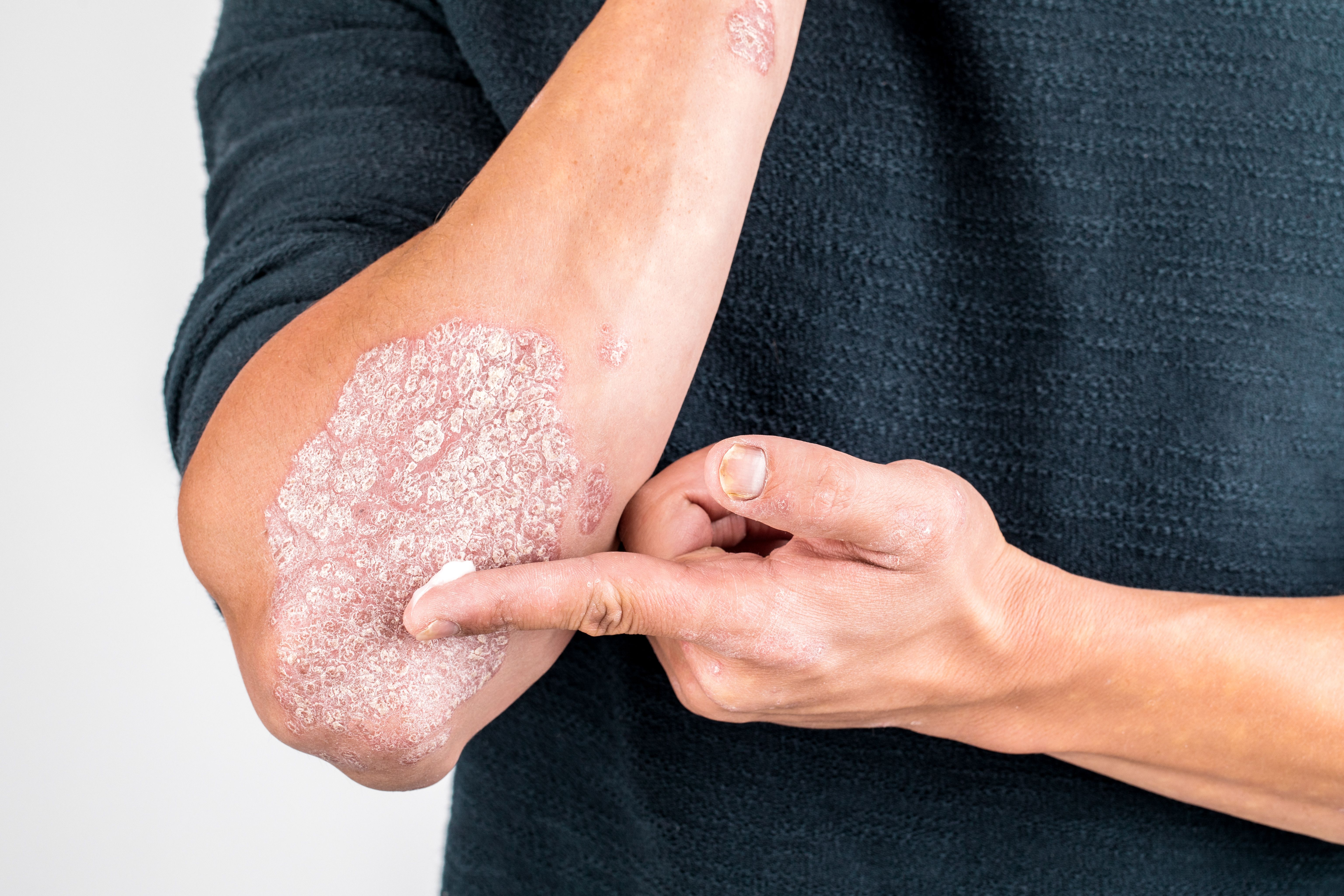- Acne
- Actinic Keratosis
- Aesthetics
- Alopecia
- Atopic Dermatitis
- Buy-and-Bill
- COVID-19
- Case-Based Roundtable
- Chronic Hand Eczema
- Drug Watch
- Eczema
- General Dermatology
- Hidradenitis Suppurativa
- Melasma
- NP and PA
- Pediatric Dermatology
- Pigmentary Disorders
- Practice Management
- Precision Medicine and Biologics
- Prurigo Nodularis
- Psoriasis
- Psoriatic Arthritis
- Rare Disease
- Rosacea
- Skin Cancer
- Vitiligo
- Wound Care
Article
Biosimilars safety performance in psoriasis
Author(s):
A study that compares the safety, efficacy and drug survival of biologics to biosimilars, finds that switching to a biosimilar had no significant impact on drug survival or safe
A study that compares the safety, efficacy and drug survival of biologics to biosimilars, finds that switching to a biosimilar had no significant impact on drug survival or safety.
The study, published in the British Journal of Dermatology, included 2,161 moderateâtoâsevere plaque psoriasis patients who were treated with biologics adalimumab (1,332 patients), etanercept (579 patients), infliximab (333 patients), ustekinumab (1,055), secukinumab (196 patients). Some of the patients were switched to biosimilars Benepali (originator Enbrel) and Remsima (originator Remicade).
"Our findings are very reassuring and demonstrate that patients switched from the originator to the biosimilar version of a drug do not appear to see any significant loss in efficacy or response to treatment and may continue therapy with the biosimilar version without significant risk of new adverse events. This is particularly reassuring in light of the large number of biosimilar drugs expected to be available in 2018 and 2019," said the study’s corresponding author Alexander Egeberg, M.D. Ph.D, of the University of Copenhagen in Denmark.
In 2015, Denmark instituted a national policy mandating that patients be started on, or switched to, biosimilars. Using the Danish DERMBIO registry, Egeberg et al. analyzed data from all patients treated for at least one month with adalimumab, etanercept, infliximab, ustekinumab, secukinumab or the biosimilars Remsima (Celltrion) and Benepali (Samsung Bioepis) between 2007 and March 2017.
The results of this study may impact the clinical decision-making process for dermatologists prescribing biologics for patients with psoriasis, because they differ from clinical trials data, he said.
"Data suggest that fewer than 30 percent of patients seen in daily practice would qualify for enrollment in a clinical trial. Findings from randomized clinical trials may not always translate into comparable efficacy in a real-life setting,” Dr. Egeberg said. “We found that treatment with secukinumab had a low performance compared to what was expected from clinical-trial data." This observation may stem from the possibility that patients who were given secukinumab were particularly difficult to treat, having failed several previous biologics, he said.
While secukinumab showed the quickest onset of action and highest proportion of Psoriasis Area and Severity Index (PASI) 100 responses - 51.4 percent among biologic-naïve patients and 35 percent among non-naïve patients at one year - it had the lowest drug survival among all the biologics.
"The high proportion of PASI 100 responders compared with the low drug survival could suggest an all-or-nothing kind of effect with this drug," Dr. Egeberg said.
Ustekinumab had the highest drug survival overall. There were no significant differences in discontinuation risk between originator and biosimilar versions of infliximab or etanercept. Treatment with higher than approved dosages was frequent for all drugs except for adalimumab and secukinumab, the researchers wrote.
In March 2016, researchers reporting in the Journal of the European Academy of Dermatology and Venereology found that ustekinumab showed the longest drug survival - slightly less than 50 percent of patients had discontinued for any cause at 100 months. Secukinumab posted the lowest drug survival with 29 percent discontinuation during the maximum two years of follow-up with 71.7 percent of patients discontinued due to lack of efficacy. All secukinumab-treated patients received on-label dosing.
Although the observation period for secukinumab was only two years, the authors wrote, "a strikingly high proportion of secukinumab-treated patients discontinued their therapy during follow-up. This finding is consistent with a single-center report published in the June 2017 issue of the Journal of the American Academy of Dermatology of 90 patients treated with secukinumab."
Infections were the most common of adverse events reported in the new study and most were associated with secukinumab, which is in line with the findings of study published in the New England Journal of Medicine in June 2014. In that study, Richard G. Langley, M.D., et al. found higher rates of infection in patients with moderate-to-severe plaque psoriasis who were treated with secukinumab and similar rates of infection to patients treated with etanercept.
"It is important to keep in mind that most of these infections did not lead to discontinuation of therapy," Dr. Egeberg said. Infliximab showed the lowest incidence of infections (12.1 per 100 treatment-years), which authors said may reflect the fact that doctors avoid giving this therapy to patients at high risk of infection.
The absolute number of secukinumab-treated patients who experienced cardiovascular events was just four. "And based on these preliminary data, it is impossible to say whether secukinumab was at fault or if this was due to random chance," he said.
Up-dosing occurred most commonly with etanercept, infliximab and ustekinumab. This finding may reflect physicians' attempts to maintain patients' response levels by increasing dosages or shortening the interval between administrations. "Although ustekinumab showed the longest overall drug survival, the frequent dose escalation for this drug warrants attention," wrote Egeberg et al.
There were a number of limitations associated with this study, including the length of the study. Longer follow-up studies may provide different conclusions. The low number of treatment series with secukinumab (196 of which only 42 patients were biologic-naïve) perhaps skewed results, suggest the authors.
While biological registries may be valuable tools for following adverse events and monitoring rare safety signals, the researchers advised interpreting drug-to-drug comparisons cautiously because patient characteristics and physician considerations in real-life settings may differ considerably from those of randomized clinical trials.
“These findings suggest that in daily practice established therapies such as ustekinumab and adalimumab may prove to be a suitable treatment option in many cases as these drugs have a well-established safety profile and dermatologists are already experienced and comfortable using them," Dr. Egeberg said.
REFERENCES
A. Egeberg, M.B. Ottosen, R. Gniadecki et al. "Safety, efficacy and drug survival of biologics and biosimilars for moderateâtoâsevere plaque psoriasis," British Journal of Dermatology. Nov. 1, 2017. https://doi.org/10.1111/bjd.16102
DISCLOSURES
For unrelated work, Dr. Egeberg has received research funding from Pfizer and Eli Lilly, and honoraria as a consultant and/or speaker from Almirall, LEO Pharma, Samsung Bioepis Co. Ltd., Pfizer, Eli Lilly, Novartis, Galderma and Janssen.
Newsletter
Like what you’re reading? Subscribe to Dermatology Times for weekly updates on therapies, innovations, and real-world practice tips.









